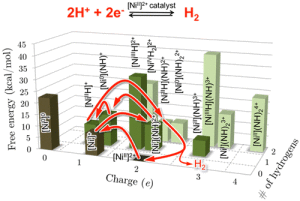
Using a desktop computer, scientists can query the model about the thermodynamic properties needed to create the desired catalysts. They can use those parameters to inform experimentalists in their synthetic work.
Image: Accounts of Chemical Research
We’re one step closer to transitioning renewable energy sources from intermittent to sustainable with this new development from Pacific Northwest National Laboratory.
Scientists are eliminating all of the unnecessary detours when dealing with molecular catalysts by elaborating on a strategy to map the catalytic route. With this strategy, researchers can modify just one part of a catalyst and see how that affects everything – including all the side reactions.
“We now know how catalysts with desired properties will behave in a given circumstance before we ever leave the computer. By working backwards, we can even ask which catalysts are the best performers for a set of conditions. We are on the verge of designing molecular electrocatalysts in silico — or conducting research by means of computer modeling,” said study co-leader, Dr. Simone Raugei.
The research implies that a faster, more efficient, more affordable, and longer-lasting form of electrocatalysts are in the future, meaning being able to store energy in chemical bonds has just become more feasible.
“Nobody has ever done research this comprehensive because we have not just the desired reaction pathway but all the undesirable ones as well,” said study co-leader, Dr. Roger Rousseau.
You can read the paper, “Toward Molecular Catalysts by Computer,” here.
And make sure to check out the “Physical and Analytical Electrochemistry, Electrocatalysis, and Photoelectrochemistry” symposium at the ECS 227th Meeting this May in Chicago!

